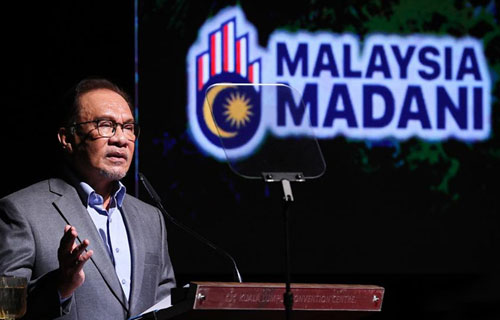Kuala Lumpur, 27 November 2023: After one year in office, the Institute for Democracy and Economic Affairs’ (IDEAS) assessment of the Madani government’s performance is mixed. Some positive commitments on crucial institutional reforms have been carried out, while backtracking of promises have occurred. On the economic front, while measures towards subsidy rationalisation and trade reforms have taken place, which are key towards boosting economic growth, the focus must be on broadening these measures, with concerns in implementation and limited capacity building efforts on the ground.
To its credit, the government has made some progress in institutional reforms during its first year in office such as the passing of the Public Finance and Fiscal Responsibility Act, the introduction of Prime Minister Question Time (PMQ) in Parliament, as well as a greater role of Parliamentary Special Select Committees in obtaining input from civil society organisations (CSOs) and government agencies. Reforms that are in the pipeline include the separation of the offices of the Attorney General and Public Prosecutor, the Political Financing Act , enactment of the Government Procurement Act, Freedom of Information Act and Ombudsman Act, amendments to the Whistleblower Protection Act, and reintroducing the Parliamentary Services Act. In fact, the government has put timelines to some of these reform agendas: the Political Financing Act is expected to be passed by the end of 2025, while the Government Procurement Act will be tabled by mid 2024. Clear timelines for the other reforms should also be announced.
“However, we are concerned that the government has backtracked on several reforms that it has promised to the people. A glaring example is the stalled reforms for equitable Constituency Development Funds (CDF). We reiterate our call for the Prime Minister to codify the equitable, transparent and accountable allocation of CDF to all Members of Parliament regardless of political parties or affiliations. Institutionalising CDF distribution through law will take time; we suggest the government initiate a Memorandum of Understanding (MOU) with the opposition that will guarantee equitable allocations in return for stability. We strongly believe this is imperative, as the switching of support in return for CDF allocations, albeit within limitations of the Anti-Hopping Law, means that the trading of money for political support continues to prevail. Moreover, withholding allocations is an affront to the reformist ideals espoused by the Prime Minister,” comments Dr Tricia Yeoh, CEO of IDEAS.
On economic reforms, in the past year, several incremental measures in subsidy rationalisation, including discontinuing subsidies for chicken and eggs, lifting electricity subsidies for high-income households, and implementing a targeted approach to diesel subsidies have taken place. Recognising subsidy rationalisation as an important structural reform is a positive indication of the government’s commitment to bolstering economic resilience and broadening the nation’s revenue base. However, there is room for improvement by broadening the rationalisation mechanism particularly in addressing leakages and ensuring a balanced impact, especially for lower-income segments. “Additionally, to expand the Government’s revenue in the medium term sustainably, the reintroduction of the GST needs to be revisited. The World Bank’s economist highlighted that in 2017, GST contributed to about 2.8% of the GDP. In 2022, that amount would be equivalent to RM 50 billion ringgit, superseding the collection of SST in 2022, which amounted to RM31 billion.”
“When the revenue base is expanded, public expenditure can be done effectively to strengthen investment on public goods like infrastructure and social protection,” emphasised Dr Juita Mohamad, Director of Economics and Business Unit.
“On trade reforms, both the RCEP and the CPTPP have continued to be enforced – no U-turns in decisions were made, while the ASEAN – China Free Trade Agreement (FTA) negotiations to include more areas of commitments like environment protection and e-commerce have started. However, we would like to see the EU-Malaysia FTA restart negotiations as well. Nevertheless, more needs to be done in terms of implementation and capacity building to ensure that local players can benefit from increased market access. Furthermore, better transparency is needed on the reporting of proposed vs. real investments to the public, industry players and regulators, as this will minimise information asymmetry and can improve investment efficiency in the long run,” Dr Juita adds.
2024 will present greater challenges to Malaysia, as we grapple with the likelihood of major changes on the global stage as Indonesia, India and the United States – the world’s largest democracies – go for elections. The prospect of an escalating conflict in the Middle East, and the ongoing US-China trade war also does not bode well. Malaysia must be prepared by strengthening the resilience of our democracy, economy and investment climate.
— END —
Download Media Statement PDF File Here
For enquiries, please contact:
Aira Azhari
Senior Manager
T: 012-6646059 | E: aira@ideas.org.my



Will KL have an elected mayor?